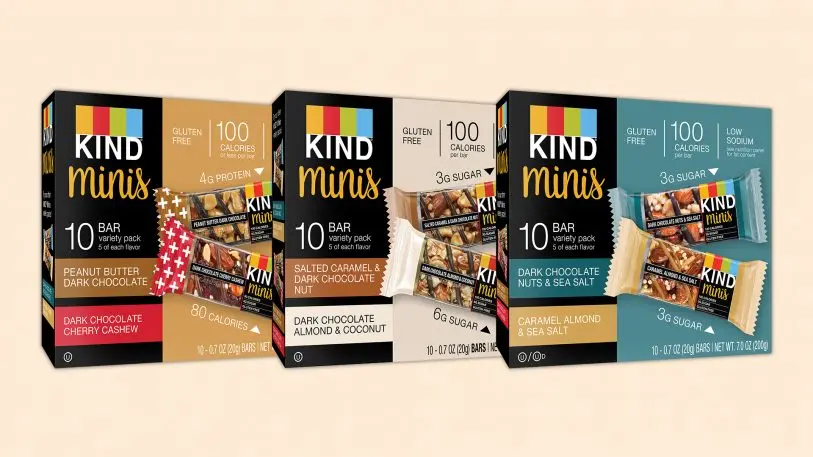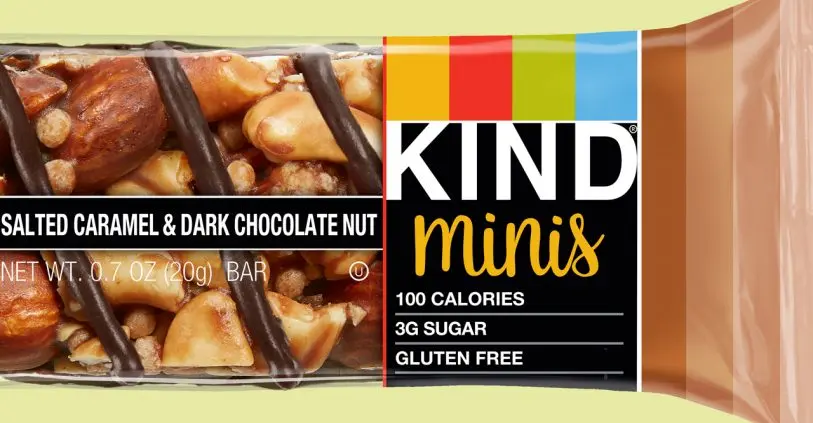Kind bars just released six mini-size snack bars. Each contains 100 calories or less, and more protein and fiber than many reduced-portion cookie, chips, or cracker options. Every single flavor also contains either dark chocolate or caramel–sometimes both.
Kind Minis are basically halved versions of already existing Kind bars. While the company offers different styles of fruit and nut bars, Kind founder and CEO Daniel Lubetzky says the new line is focused to attract customers who are choosing between popular smaller packs of Chips Ahoy!, and Cheez-its. Minis flavors include two of Kind’s best sellers: Dark Chocolate Nuts & Sea Salt, and Carmel Almonds & Sea Salt, along with other flavors featuring peanut butter, cherries, and coconuts.

The Minis are also hitting shelves at an interesting time: In recent years, the company won a dispute with the FDA about its healthful product claims, and has proactively reformulated some flavors to avoid other kinds of criticism.
The little bars have between 5 and 8 grams of fat, but most of it is the good kind of fat–polyunsaturated or monounsaturated–from several core ingredients: almonds, cashews, and peanuts. That’s a distinction that Kind fought over before: In March 2015, the FDA issued the company a warning letter for using the term “healthy” on the back of its wrappers because, according to guidelines at the time, snack foods with more than 3 grams of total fat or 1 gram of saturated fat weren’t allowed to make that claim.
Those guidelines were about 20 years old and didn’t include modern dietary science. So Kind pushed back, filing a citizen petition that urged the agency to update its regulations. In May 2016, the FDA agreed and said the company could continue using the term. It is now working to revise its guidelines.
The typical Kind Mini has between 3 and 6 grams of total sugar, at least half or more of which is added. But that added sugar is printed right on the package, part of a shift toward broader transparency that Kind began in August 2016, well ahead of an FDA mandate that will eventually become a standard requirement for all food labels.
Many ingredients have naturally occurring sugars that aren’t inherently unhealthy. “We are very open about sugar and added sugar because we do use it for functional reasons but in very responsible portions,” says Kind’s health and wellness expert Stephanie Perruzza.

A few years ago, Kind began working to reduce the amount of extra sugar in its original line of Fruit & Nut bars and some other early rollouts. As a result, those levels have dropped between 14% and 57% depending on the recipe, in part by “swapping sweetened fruit with unsweetened fruit and reducing added sugar in certain ingredients like yogurt coatings” according to a news release. Later brand extensions like its Nuts & Spices line (several of which are now also available as Minis) were conceived to have low sugar from the outset.
In general, each new snack averages between half a teaspoon and a full teaspoon of added sugar per bar. What that really means for consumers is up for debate. There’s still some variance in what experts consider okay in terms of added sugar: The current USDA guidelines recommend that the average person consume no more than 12 teaspoons or about 50 grams per day. The World Health Organization recently issued a stricter suggestion, advocating a maximum of no more than 6 teaspoons–or about 25 grams daily–to maintain a healthy lifestyle.
For those erring on the side of caution, that means one bar from the most additionally sweetened of the set–either Peanut Butter Dark Chocolate, or Dark Chocolate Almond & Coconut–can cost you 16% of the day’s allotment.
“Our philosophy is to design products that people can feel good about eating every single day,” says Lubetzky, who still offers a bit of obvious advice. “Even if you could eat 10 Kind products a day, I would not recommend that, because I think it’s very important that people have a balanced set of solutions–and as much fresh fruits and vegetables as possible.”
Recognize your brand’s excellence by applying to this year’s Brands That Matter Awards before the early-rate deadline, May 3.